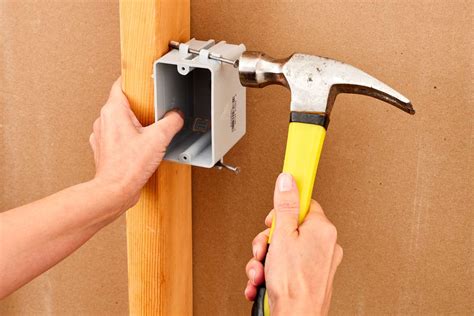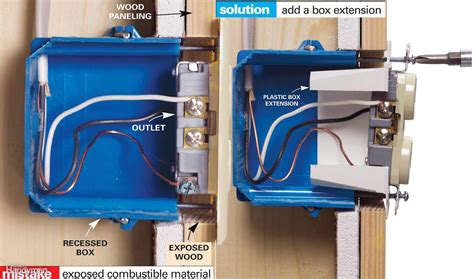electrical box 5 8 drywall Most residential drywall is 1/2- or 3/8-inch thick, so keep a handful of drywall strips of this thickness on hand to facilitate electrical box installation. If you are using a different wall . By incorporating a wholesale CNC PVC pipe threading machine into your production line, you're setting your business up for success. Boost your productivity, reduce your labor costs, and offer an unparalleled level of precision in your end products.
0 · putting electrical box existing drywall
1 · installing wall mounted electrical boxes
2 · installing electrical box on drywall
3 · electrical outlet boxes for drywall
4 · electrical box for existing wall
5 · electrical box for existing drywall
6 · drywall mounted electrical box wings
7 · drywall mounted electrical box
Trace-A-Matic has a wide variety of precision CNC turning centers to machine high-quality prototypes, and high-volume production runs. Decades of proven machining experience and continuous technology investment has earned the trust of major OEMs to manufacture their mission-critical parts.
We are now switching to 5/8" interior drywall throughout. What is best practice, to simply line up with the box alignment tabs or should I extend the box out another 1/8" to the full . Installing electrical boxes the depth of drywall while studs and joists are exposed is a handy and simple solution for homeowners. To do this . Most residential drywall is 1/2- or 3/8-inch thick, so keep a handful of drywall strips of this thickness on hand to facilitate electrical box installation. If you are using a different wall . Follow these expert tips to install an electrical box into drywall or plaster without the need for wall studs or joists. Not all fixtures need to be attached to a wall stud or joist. .

Installing an electrical box at the proper depth of drywall involves several steps, including determining the location of the box, marking the outline on the drywall, cutting out the opening, measuring and cutting the hole in the . Safely and effectively install an electrical box in drywall by following step-by-step guidelines, ensuring proper placement, secure installation, and thorough testing for a successful DIY electrical project. Cut-in electrical boxes secure into the drywall or plaster using wing screws or Madison straps, depending on the type of box you have. The wings press against the drywall and hold the box firmly in place. Likewise, . If the 5/8" drywall is installed correctly, your boxes will be 1/4" recessed. 98% of drywallers install the drywall incorrectly in which case expect your boxes to be recessed 5/8". Expect to use a lot of box extenders.
We are now switching to 5/8" interior drywall throughout. What is best practice, to simply line up with the box alignment tabs or should I extend the box out another 1/8" to the full 5/8" depth? Installing electrical boxes the depth of drywall while studs and joists are exposed is a handy and simple solution for homeowners. To do this on your own, buy switch and receptacle boxes that meet local codes and are large enough for the wires they hold. Most residential drywall is 1/2- or 3/8-inch thick, so keep a handful of drywall strips of this thickness on hand to facilitate electrical box installation. If you are using a different wall thickness (such as 5/8-inch thick, required for some firewalls) make sure the reference strips match that thickness. Follow these expert tips to install an electrical box into drywall or plaster without the need for wall studs or joists. Not all fixtures need to be attached to a wall stud or joist. Lightweight fixtures can hold up on plaster or drywall if you have a remodel electrical box.
putting electrical box existing drywall
Installing an electrical box at the proper depth of drywall involves several steps, including determining the location of the box, marking the outline on the drywall, cutting out the opening, measuring and cutting the hole in the framing, inserting and securing the box, connecting the electrical wiring, and finally, installing the wall plate .
Safely and effectively install an electrical box in drywall by following step-by-step guidelines, ensuring proper placement, secure installation, and thorough testing for a successful DIY electrical project. Cut-in electrical boxes secure into the drywall or plaster using wing screws or Madison straps, depending on the type of box you have. The wings press against the drywall and hold the box firmly in place. Likewise, Madison straps secure the box by grabbing on behind the drywall to support the box.
I am installing a 2 gang electrical box in my basement through 5/8" drywall. The back side of the wall is in an unfinished part of the basement, so I have access to attach the box to the stud.My issue is that I need to install new work boxes so that they extend 1 1/4" beyond the stud. This way, when my second layer of 5/8" drywall goes up, it will be flush. I don't have enough depth with the boxes I am using to go out 1 1/4", so I am wondering if I can extend it 1 1/8" instead. If the 5/8" drywall is installed correctly, your boxes will be 1/4" recessed. 98% of drywallers install the drywall incorrectly in which case expect your boxes to be recessed 5/8". Expect to use a lot of box extenders. We are now switching to 5/8" interior drywall throughout. What is best practice, to simply line up with the box alignment tabs or should I extend the box out another 1/8" to the full 5/8" depth?
installing wall mounted electrical boxes
Installing electrical boxes the depth of drywall while studs and joists are exposed is a handy and simple solution for homeowners. To do this on your own, buy switch and receptacle boxes that meet local codes and are large enough for the wires they hold.
Most residential drywall is 1/2- or 3/8-inch thick, so keep a handful of drywall strips of this thickness on hand to facilitate electrical box installation. If you are using a different wall thickness (such as 5/8-inch thick, required for some firewalls) make sure the reference strips match that thickness. Follow these expert tips to install an electrical box into drywall or plaster without the need for wall studs or joists. Not all fixtures need to be attached to a wall stud or joist. Lightweight fixtures can hold up on plaster or drywall if you have a remodel electrical box.
metallic jewel-tone fabric buy in bulk
Installing an electrical box at the proper depth of drywall involves several steps, including determining the location of the box, marking the outline on the drywall, cutting out the opening, measuring and cutting the hole in the framing, inserting and securing the box, connecting the electrical wiring, and finally, installing the wall plate . Safely and effectively install an electrical box in drywall by following step-by-step guidelines, ensuring proper placement, secure installation, and thorough testing for a successful DIY electrical project.
Cut-in electrical boxes secure into the drywall or plaster using wing screws or Madison straps, depending on the type of box you have. The wings press against the drywall and hold the box firmly in place. Likewise, Madison straps secure the box by grabbing on behind the drywall to support the box. I am installing a 2 gang electrical box in my basement through 5/8" drywall. The back side of the wall is in an unfinished part of the basement, so I have access to attach the box to the stud.
installing electrical box on drywall
electrical outlet boxes for drywall
electrical box for existing wall
electrical box for existing drywall

eMachineShop manufactures low-cost prototype and production runs of custom parts. Get a fast quote or design and order your parts with our free CAD software. We offer CNC Milling and Turning, Sheet Metal Fabrication, Injection Molding, and dozens of materials.
electrical box 5 8 drywall|drywall mounted electrical box wings